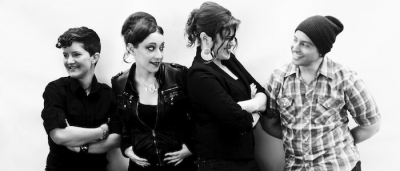"The World Will Be Bright Again"
- ‹ previous
- 7 of 98
- next ›
Tough as nails, and yet, at the same time vulnerable. These are words that can rarely be applied to indie rock lately. For the Shondes, though, it’s just the start. Past vague genres like “rock” or oblique, somewhat condescending descriptions like “feisty,” it’s hard to figure out exactly where this group fits into the massive pantheon of real rebel music.Searchlights, their recently released third album, confirms that kind of delicious confusion.

I ask Elijah Oberman, the group’s violinist, how they would describe themselves. This is the response I get:
"Um... well we're a rock band, and we have very punk energy even though we don't really sound like a punk band, and there's a female lead singer, and violin, and lots of harmony, and we rock out really hard when we play live, and there's some Jewish music influence in there somewhere and we're also queer and political and... yeah"
I laugh. It’s not really the answer that’s problematic, but the way the whole question is formulated in the first place. The long-ongoing trend in music journalism is to find a way to “define” every artist, stuff them into an easy-to-identify box. The best art, however, doesn’t easily categorize itself. It’s like a Harold Pinter play: by all conventions it shouldn’t work, but it does.
“Close the Door,” the opening track of Searchlights, wastes absolutely no time slicing Fureigh's lo-fi guitars and Temim Fruchter's steadfast drums into the listener’s ears. It would be pleasant enough as an admittedly unremarkable indie song until one notices the lilting Klezmer violins and Louisa Rachel Solomon’s dramatic, almost Old World singing voice. It’s this mixture of extremes that makes the music work so uniquely well. All efforts to label--along with their apparent futility--fade into the background.
Ever since coming together, the Shondes have done their best to have their music speak for itself and dodge their seemingly novel makeup. As one might guess from the group’s Klezmer and Yiddish influences, all members are Jewish. All are also either queer or gender variant in one way or another. The group has, perhaps unsurprisingly, been consistently featured in the culture sections of countless Jewish and LGBT newspapers and sites.
The best of these profiles, however, admit how woefully insufficient and even insulting it would be to simply describe the Shondes as “Jewish rockers” or “a queer band.” Listening to the album myself--a straight, male, lapsed Catholic turned agnostic--I can’t help but be moved, even in moments like this from “Give Me What You’ve Got”:
“Go on, go on and talk
Say whatever you want
Call me a home-wrecker, call me a monster
Give me what you’ve got
I know that I’m the villain in your eyes
But the night is on my side, I’ve got nothing to hide”
Swirling fiddle and clipped guitar work make this easily the catchiest song on Searchlights, especially as it crescendos into textural harmonies with reckless abandon toward the song’s end. All this, combined with Solomon’s heart-on-sleeve delivery force you inexorably into the band’s point of view regardless of “identity.”
Something else doesn’t square with my own narrow expectations while hearing the songs; the Shondes are frequently referred to as a “political band,” and that’s admittedly how I’ve always viewed them. There’s plenty on Searchlights easily described as righteous and heart-strong, but no obvious indicator of the group’s left-wing, anti-establishment stances. Elijah mollifies me again, and his response is worth reading (and re-reading) in full:
“On the one hand I think it's important to regard the personal as political, like the songs onSearchlights, and on the other I think it's still important and inspiring to have music that speaks directly to things I'm passionate about politically, so they're both important.
“I don't think Searchlights is an overtly political album. It's about friendship, growing up and feeling all the horrible and wonderful parts of life. I also think that how you process and experience your life, how you treat your loved ones, and how you get through hard times and joyful ones are political decisions, decisions about what kind of person you want to be in the world. And I think that we're a political band as a whole package even if we're not always writing ‘issue’ songs, which is what most people think of when they think of political music.
“The way we are in our personal lives, or the things we say from stage, or the kinds of shows we play are all part of the picture as much as the lyrics of our songs, so it doesn't feel like a contradiction to me; it feels like an integration of all parts of who we are as people and as musicians.”
Apparently I’m still not satisfied, so I ask about “The Fortress,” the seventh song on Searchlights. Is that a reference to Palestine I hear there when Louisa sings that “nothing will survive its walls”? Once again, Elijah gives me the answer I wasn’t expecting, yet is still somehow right-on:
“While we do proudly talk about being Jews who support Palestinian liberation, I'm sorry to say you might be reading into it. ‘The Fortress’ is about isolation and building walls around yourself because you feel like you can't trust people and have to protect yourself, and then being left with the feeling of being alone in the fortress you've built.”
I love this job--especially when I’m proven wrong in a manner such as this. That barrier--or wall if you will--between the personal and political is easily one of the most pernicious obstacles keeping folks on both sides of the aisle from enjoying good music and putting it in context. If there’s anything we’ve learned over the past four weeks of Occupy Wall Street, it’s that politics isn’t just something to be done every two to four years, but something that holds sway over just about every aspect of our lives. How many of us have allowed the weight of a profoundly unjust world to cut us off from our love? How many of us have found ourselves crying tears of relief when the subtlest or most obvious of events finally breaks down that alienation? How can one deny that feeling human in that most inhuman of times isn’t a political act?
And certainly, the Shondes’ ironclad concern with every individual’s right to feel human is undeniable. This past summer saw some in the band’s hometown of New York City attempt to bargain one people’s humanity in exchange for another’s after Queers Against Israeli Apartheid marched in the Pride Parade. Racist, insensitive cries about Arab homophobia choked the debate.
The Shondes didn’t cave. During our interview, Elijah is glad I mention this whole debacle. “It's upsetting to me that this Islamaphobia and anti-Arab racism comes out in queer communities in that way,” he says. “Of course there is homophobia in Muslim communities just like there is everywhere, but I think it's clear that's not an excuse for apartheid. You think Palestinian queer people support Israel just because they may experience homophobia in their communities? That's absurd. We can fight for justice in Palestine and also support Palestinian queers who are doing incredibly important work in their communities just like we continue to do it in ours.”
Haters will no doubt scoff at such a notion, but it seems apparent that this kind of integrity, this kind of unbending principle, makes Searchlights’ content pop so much more brightly. These ten tracks remind you that there’s always something at the other end of a struggle, and, as Louisa reminds us in the closing track, we all have the to believe that “the world will be bright again.” For what it’s worth, this writer believes there’ll be more artists like the Shondes in this brighter world.
Alexander Billet, a music journalist and activist living in Chicago, runs the website Rebel Frequencies (http://rebelfrequencies.blogspot.com) and can be reached at rebelfrequencies@gmail.com.
- Login to post comments
-




